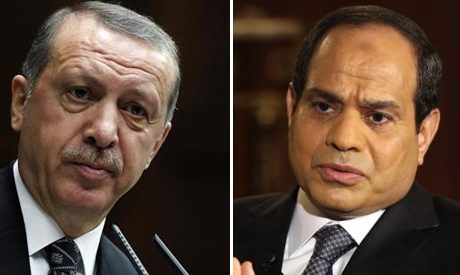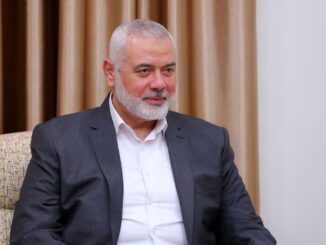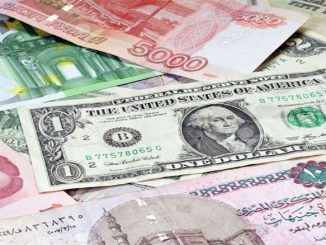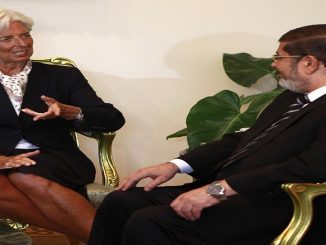
Turkey has started mending its foreign relations with neighboring countries, including Israel and Russia after deterioration for a period of time.
In this context, many observers predicted that Egypt would be one of the countries that the Turkish government would seek to revive its diplomatic relations during the coming period.
Since he came to power in late May, Prime Minister Binali Yildirim has been quite vocal about mending ties with all countries in the Mediterranean and the Black Sea regions, including Israel, Russia, Egypt and Iraq.
Yildirim said in an address to his Justice and Development Party’s (AKP) “Politics Academy” on July 11 that “From now on we will improve our friendships with all countries surrounding the Black Sea and the Mediterranean.
We will keep our disagreements at a minimum, “he cited that there are “many reasons” that oblige Turkey to normalize its ties with neighboring countries.
The normalization process started with Israel as both countries finally reached an agreement to break on June 28.
Then, Turkey continued with Russia on the same day, as President Recep Tayyip Erdogan sent a letter to President Vladimir Putin to express Turkey’s deep sorrow over the shooting down of a Russian warplane last year.
Accordingly, the normalization campaign was expected to endorse Egypt as well, after Prime Minister Yildirim implied that minister-level talks could be carried out for trade and economic cooperation.
“This would be a way to avoid leader-to-leader dialogue between Turkish President Erdogan and Abdel Fattah al-Sisi,” said Hurriyet, a Turkish daily.
A senior AKP official has even suggested that a delegation composed of a number of ministers would be dispatched to Egypt, but this claim was later denied by the government’s spokesperson.
However, the recent statement by Erdogan suggested that normalization with Egypt won’t be an easy task.
Last week, Erdogan spoke about the issue saying, “We have no problems with the Egyptian people. The problem with Egypt is an issue with its administration, particularly with its ruler.”
Erdogan’s words were later echoed by many government members who reiterated Turkey’s position regarding opposition to the military coup led by al-Sisi in 2013, which ousted the first democratically elected President Mohamed Morsi.
In the same context, Turkish Deputy Prime Minister Numan Kurtulmuş has gone even further, calling on Egypt to take steps on the issue of political prisoners, including Morsi.
“All this makes it seem that normalization between Ankara and Cairo would be very difficult, if not impossible, “said Hurriyet daily news.
The recent statements from Turkey have surely been interpreted by Cairo as the latest Turkish intervention into the internal affairs of Egypt, and they will not help Yildirim’s government reconcile with the Cairo government.
Moreover, it seems that the Egyptian regime isn’t encouraged to normalize ties with Ankara unless the latter recognizes the legitimacy of the Sisi administration.
What’s more, Egyptian Foreign Minister Sameh Shoukry’s historic visit to Israel also reflects Cairo’s continued intention to be in control of Palestine-related issues as the main leader of the Arab world.
In this context, Egypt’s FM has paid a secret visit to Ramallah, in the West Bank to hold a meeting with the Palestinian Authority Chairman Mahmoud Abbas.
According to a report of Alkhaleejonline, the first file discussed on the negotiations table was the Turkish-Israeli agreement and how to abort it to keep Gaza on its current status.
A prominent leader in Fatah movement,who asked to remain anonymous for his sensitive position, said that the Palestinian Authority and Egypt believe that the Turkish-Israeli agreement on Gaza strip is “dangerous” and has negative repercussions (for them).
He said that “During a closed meeting between Abbas and Shoukry which lasted for more four hours, the Egyptian official didn’t hide his fear toward the increasing Turkish influence in the Gaza Strip through passing aids estimated at 11 thousand tons which would be a start for lifting the blockade gradually on Gaza, which make Gaza less dependent on its neighbors.
He explained that “Shoukry told Abbas in a verbal message carried from Abdel Fattah al-Sisi that the latter perceives that the Turkish influence is expanding in Gaza and that easing the blockade on the Gaza Strip would harm the Egyptian national security and must come to an end.”
He revealed that Fatah leader Abbas and Shoukry discussed in-depth ways to face this agreement and that there are practical steps in this direction that will start with a foreign tour by Abbas to a number of Arab countries to show what he called the “risks” of this agreement on Gaza and Egypt.
He also added that there was an agreement not to enter any new player in Gaza strip and to abort all the Turkish plans to control Gaza with the assistance of Hamas, whose relations have deteriorated with the Egyptian ruling regime.
Alkhaleejonline’s reporter was informed that Abbas would hold in his headquarters at the west bank two emergency meetings for the PLO Executive Committee and the Fatah Central Committee to inform them of his meeting with Egypt’s foreign minister and the steps that are going to be taken to face the latest Turkish-Israeli agreement.”
According to the political analyst Mostafa Sawaf, any step that will be taken by any Arab or Islamic country including Turkey- to lift Gaza siege imposed for 10 consecutive years will be faced with refusal from the Palestinian Authority and Egypt.
“Egypt and the PLO want to continue Gaza’s siege, but the latest Turkish move to send aids, improve the economic projects, solve the power and water supply problems will make both parties feel that Gaza is getting out of their control.”
In addition, another reason why Turkey is unlikely to normalize ties with Sisi’s Egypt that the strong opposition of Erdogan and the AKP to the military coup in Egypt has also a domestic policy dimension.
The coup that ousted Morsi came at a moment when Erdogan and his government were facing massive protests in weeks-long rallies in mid-2013, known as the Gezi protests. For Erdogan, there was no difference between the two processes, apart from the fact that “foreign powers” succeeded in their coup attempts in Egypt but failed in Turkey, according to Hurriyet daily news.
Looking from this perspective, it should be stressed that any sort of normalization of ties with Egypt would also mean a complete u-turn from Erdogan against his very principles.
The Turkish-Egyptian relations is unlikely to happen and if it was to happen; it will be on a limited scale that varies from the deep normalization with the Russia and Israel as both Caito and Ankara have divergent values and interests over key issues and principles.



